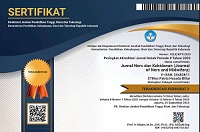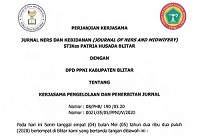The Analysis of Exclusive Breastfeeding Towards the Stunting Cases
DOI:
https://doi.org/10.26699/jnk.v10i2.ART.p265-271Keywords:
exclusive breastfeeding, stuntingAbstract
Stunting is a condition in which a child experiences developmental delays so that their height does not match their age, due to health problems during pregnancy, illness during infancy, and long-term lack of nutrition. One of the reasons for stunting is eating unbalanced, including exclusive breastfeeding as a baby. The impact of stunting besides growth, also causes minor illnesses, impaired brain development and intelligence, in the long term it can cause decreased mental capacity, decreased immune system so that it becomes weak easily, obesity, diabetes, stroke, heart and blood vessel disease, and old age disability. The aim of this study was to analyze the history of exclusive breastfeeding for the incidence of stunting. The research design was a quantitative correlation retrospective cohort approach, a population of 100 people with a sample of 50 people using the technique of simple random sampling. The study used Microtoice to measure the child's height was confirmed in table Z-Score and interview sheets for exclusive breastfeeding data. Analysis using Fisher Exact showed that the calculated P value (0.00) < error rate (0.1) had a relationship between a history of exclusive breastfeeding and the incidence of stunting. Based on this research, further information was needed on how to prevent stunting regarding the importance of clean and healthy life, especially for family members who smoke, because smoking had a negative impact on stunted toddler growth hormonesReferences
Alision, B., & Dkk. (2018). A review of child stunting determinants in Indonesia. Maternal and Child Nutrition, 14(4). https://onlinelibrary.wiley.com/doi/10.1111/mcn.12617
Fitri, L., & Ernita. (2019). Hubungan pemberian ASI eksklusif dan MP ASI dini dengan kejadian stunting pada balita. Jurnal Ilmu Kebidanan, 8(1), 19–24.https://jurnal.ikta.ac.id/kebidanan/article/view/112
Handayani, S., Kapota, W. N., & Oktavianto, E. (2019). Hubungan Status Asi Eksklusif Dengan Kejadian Stunting Pada Batita Usia 24-36 Bulan Di Desa Watugajah Kabupaten Gunungkidul. Medika Respati :JurnalIlmiahKesehatan,14(4),287.https://medika.respati.ac.idindex.php/Medika/article/view/226
Heuvel,Meta Van Den.2019. Metabolomics, stunting and neurodevelopment.EBioMedicine 44 (2019) 10-11. https://www.ncbi.nlm.nih.gov/pmc/articles/PMC6606741/
Ibrahim,A et all.2021. Soil transmitted helminthiasis and stunting among school-aged children in Ibadan: Prevalence and risk factors. Parasitology and parasitic infections / International Journal of Infectious Diseases 101(S1)(2021)419–436. https://www.ijidonline.com/article/S1201-9712(20)31830-0/fulltext
Latifah, A. M. et al. (2020). Hubungan Pemberian Asi Eksklusif Dengan Kejadian Stunting Pada Balita 1-5 Tahun.HealthSciencesJournal,4(1),142.https://studentjournal.umpo.ac.id/index.php/HSJ/article/view/131
Leroy,Jef L and Edward A Fronggillo.2019.Perspective: What Does Stunting Really Mean? A Critical Review of the Evidence. Adv Nutr 2019;0:1–9.
https://www.sciencedirect.com/science/article/pii/S2161831322003982?via%3Dihub
MC.DONALD, J. H. (2009). HANDBOOK OF BIOLOGICAL STATISTICS. In 15th AIAA/CEAS Aeroacoustics Conference (30th AIAA Aeroacoustics Conference).
Muslim,Azdayanti et all.2021.Nutritional status, hemoglobin level and their associations with soil-transmitted helminth infections between Negritos (indigenous) from the inland jungle village and resettlement at town peripheries.
https://journals.plos.org/plosone/article?id=10.1371/journal.pone.0245377
Nurhidayati1, T., Rosiana, E., & Rozikhan. (2020). USIA IBU SAAT HAMIL DAN KEJADIAN STUNTING PADA ANAK USIA 1-3 TAHUN. The Journal of the Japan Society for Respiratory Endoscopy, 37(3), 343.https://ejournal.poltekkes-smg.ac.id/ojs/index.php/micajo/article/view/6491
Papier,Keren et all.2014. Childhood Malnutrition and Parasitic
Downloads
Published
How to Cite
Issue
Section
License
Copyright (c) 2023 Jurnal Ners dan Kebidanan (Journal of Ners and Midwifery)

This work is licensed under a Creative Commons Attribution-ShareAlike 4.0 International License.






